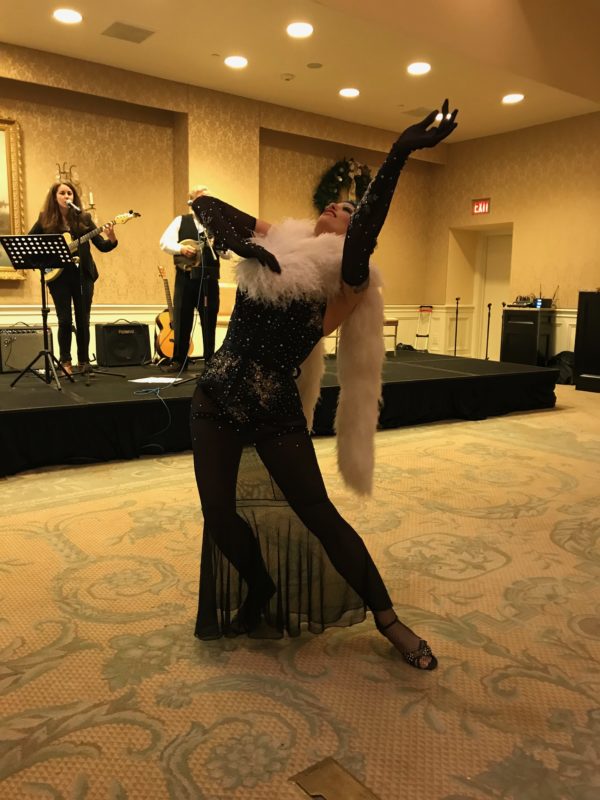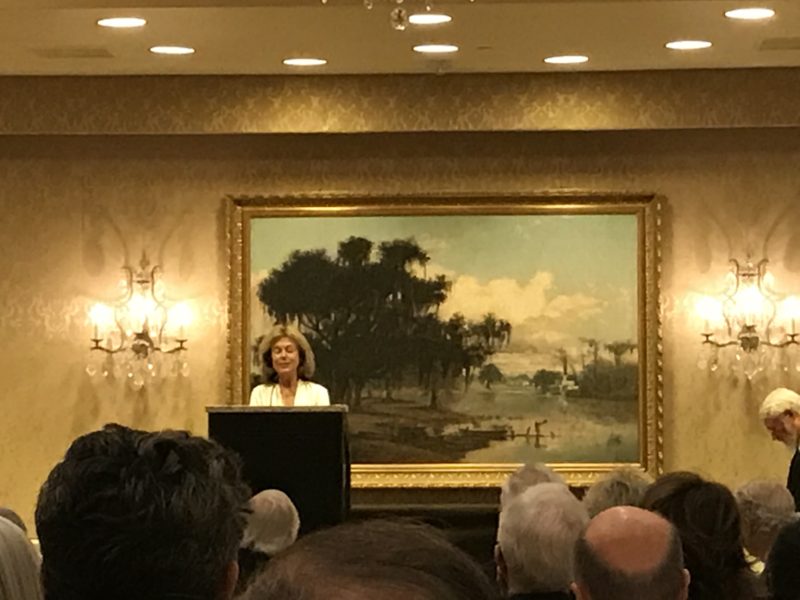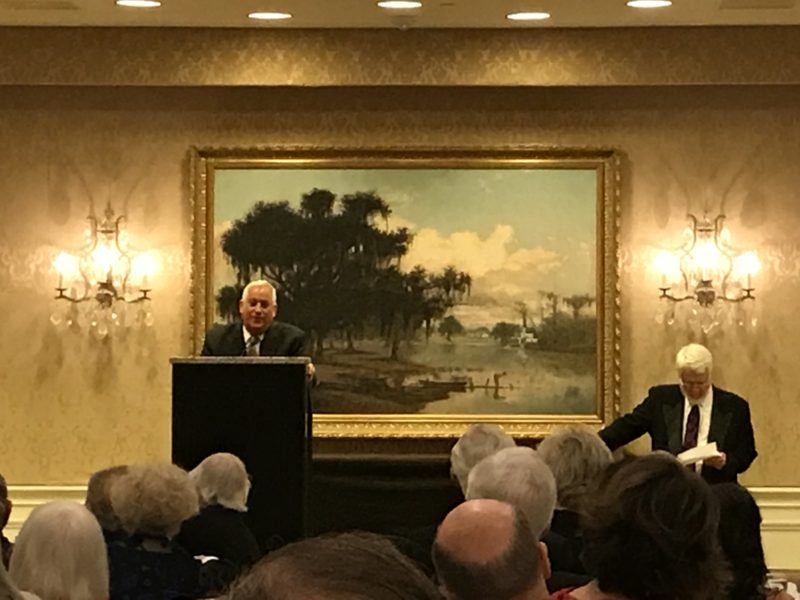Writers, editors, agents, and marketing professionals from New Orleans to California to even France and Wales gathered at the Hotel Monteleone from December 6-10, 2017, to celebrate both well-worn and emerging literature, and to dance to New Orleans’ world class music.
It was the festival’s twentieth anniversary, and the last hurrah for co-organizers and spouses Rosemary James and Joe DeSalvo. Well, to know either of them is to understand that their future holds innumerable hurrahs; their relentless joie de vivre ensures it. But this year marks their last Words & Music orchestrating hurrah. After twenty years of devotion to great books and the writers who write them, James and DeSalvo are passing the mantle.
Megan Holt, a Postdoctoral Teaching Fellow at Tulane and a Young Leadership Council Project Leader for One Book, One New Orleans, has taken the reins. Holt, an avid reader and passionate literacy advocate, plans to donate all future Words & Music proceeds to One Book, One New Orleans, a community literacy initiative to place books in the hands of incarcerated people, English as a Second Language readers, low-literate native English speakers, and others who face obstacles to accessing our society’s cherished stories.
Holt envisions various New Orleans communities simultaneously reading selected books, making New Orleans “stronger and more literate.”
This year’s festival theme was war, calling on panelists to reflect on a few of our nation’s past wars, including Vietnam, the Korean War, and of particular relevance to the South, the Civil War.
On Friday, conference-goers ambled to Arnaud’s at the lunch hour, for redfish and remarks by Robert Olen Butler, an Army counterintelligence special agent during the Vietnam War. Butler regaled the group with stories of his many nights hanging out at a noodle shop in a back alley, where Vietnamese people and Americans met each other on common terms, sharing their families, their love lives, their joys and fears.
Years later, Butler would visit Vietnam and learn that this noodle house had been a designated and well-used meeting place for the Vietcong.
“Intelligence was not my calling,” Butler quipped. “The human heart is.”
Butler spoke of “an idea this country has long believed in, but has never lived up to, but has believed in it enough that it happened in some ways … the melting pot. And it cracked forever with the Vietnam War.” He added that trouble can erupt “if everyone inside your circle is terrific and everyone outside it is insufficient or worse. That’s what happened in Vietnam.”
Among some of this year’s participants, a second festival theme emerged: Some panelists and audience members discussed self-erected barriers against stepping into the professional writer role.
Louisiana native Skip Horack, a Stanford University Wallace Stegner Fellow, spoke on a panel with seven friends and fellow fellows, on a panel entitled “A Writers Roundtable: Fiction in Conversation with Nonfiction.” Horack’s novel The Eden Hunter won the New York Times Book Review Editors’ Choice Award, and his story collection The Southern Cross won the Bread Loaf Bakeless Fiction prize, two major Hopwood awards, and the Andrea Beauchamp Prize for short fiction.
This illustrious writing career was once a hidden ambition: Horack recounted his experience working by day as an attorney in a Baton Rouge law firm he liked very much, while secretly tending to his dream of writing by night. He made the roughly two-hour drive from Baton Rouge to New Orleans after work once a week, for a writing class at the University of New Orleans, and didn’t tell his law firm colleagues about this other side of his life.
To an audience member question about how one knows if a student or other burgeoning writer has the talent to fuel a successful literary career, Horack addressed the challenge of fielding that question from a person with such hopes. “It’s so hard because good dancers and bad ones love it equally.”
Horack’s co-panelist and multiple literary prizewinner Otis Haschemeyer added, “Even the people standing against the wall love to dance.”
Friday night, new burlesque opera group Tabasco sang for conference members, and beloved New Orleans native and burlesque dancer Bella Blue performed a striptease for the group, allowing us to indulge the wilder sides of our natures.

Bella Blue performs a burlesque show for Words & Music 2017 conference participants. (Photo by: Katie Burke)
On a Saturday panel about character-driven fiction, Louisiana-born Tim Gautreaux—who released a portfolio of novels and stories this year entitled Signals: New and Selected Stories—tackled an audience member question about capturing dialogue and accurately transcribing it onto the page.
“For dialogue, listen to people, and write down everything they say.” Gautreaux relayed a true story about a writer seeking authentic New Orleans speak, who took a bus that shuttles New Orleans’ poor to Charity Hospital and wrote down everything she heard on the ride. The writer overheard one bus rider ask another, “Does the grocery store have good tomatoes?” The answer, recorded in the writer’s dialogue notes, was: “Oh yeah, they eat real good.”
Furthering the war theme was debut novelist Kathryn Ramsperger, who read from her character-driven novel entitled The Shores of our Souls, the first of a trilogy, informed by her humanitarian work in war-torn, poverty-stricken lands overseas.
“This story is about two strong but scarred individuals,” Ramsperger began. “They couldn’t be more different, and so they fall in love.”
Ramsperger recounted to a rapt audience some of her experiences as a world traveler. Her heartfelt descriptions of people she encountered in faraway places brought them right into the room.
A weather-related travel debacle for one slated panelist resulted in a second lunchtime talk from Robert Olen Butler. To no one’s chagrin, Butler told more stories, this time set on American soil, with the journey being Butler’s book tour with his Pulitzer-prizewinning novel, A Good Scent from a Strange Mountain.
Butler captivated the audience with his Pulitzer Prize backstory. “I went to my book signing at a wonderful independent bookstore in Oakland, California. Everyone in Oakland who had read my book showed up at the signing … which means zero people were there.”
He added, “At the Seattle signing, six people showed.” Butler recalled that when he saw the Seattle six, instead of falling into a practice he said some writers employ at low turnout events—i.e., changing the reading into an “intimate discussion” and concluding the event earlier than anticipated to return to the hotel—Butler decided he would “give these six people the performance of a lifetime.” By his telling, Butler held nothing back, finished at the scheduled end time, said goodnight to the clerk, and proceeded to win the Pulitzer.
The next year, Butler returned to the Seattle bookstore for another reading, this time to a crowd of 200. After Butler had signed the last book, the clerk approached him, telling him that the day after Butler’s reading the previous year, then-Pulitzer judge Charles Johnson wandered into the bookstore and asked the clerk about the previous night’s reading.
The clerk told Johnson how gracious Butler had been to the small crowd, and how riveting a reading he’d delivered. With this endorsement, Johnson bought Butler’s book, then selected it for the Pulitzer, from the 4,000 books Johnson had read to judge the contest.
Continuing with the unofficial, secondary theme of writers owning our place as such, publishing panelist and multiply published poet Sarah Cortez advised to the writers in her midst, “It is essential to make the transition from hobby to career.”
Saturday night, conference members and many longtime friends of James and DeSalvo donned cocktail attire, to attend a spectacular gala. Craig Adams, who is a New Orleans Maritime University professor, band leader, and Zulu Social and Pleasure Group choral member, carried the night with one Fats Domino tune after another, beginning with a rendition of “Blueberry Hill” so realistic, it initially seemed the ghost of Fats had joined the fête.
Distinguished conference panelist Roy Blount, Jr. served as toastmaster, as speakers honored James and DeSalvo for founding Words & Music, and for their decades of painstaking dedication to the Faulkner Society/Words & Music community.
Joyce Blaylock, author of Adelicia: Grace, Grit, & Gumption—a historical novel about a nineteenth-century Southern woman who, as Blaylock fondly says, “did what she set out to do”—told the gala crowd that shortly after Hurricane Katrina, Blaylock visited the Pirate’s Alley bookstore, a French Quarter shop that James and DeSalvo own.
Blaylock recalled that as she and DeSalvo spoke of the hurricane’s horrors and aftermath, DeSalvo said of the bookstore, “There’s nobody here to come by.”
Thereafter, Blaylock continued, James and DeSalvo gathered people at the Monteleone, already the annual conference venue, to talk about literature. “It didn’t matter if you had one dime in your pocket or many dimes in your pocket; they believed in you.”
An upbeat second line proceeded outside as Blaylock added, “There’s a goodness, a kindness, and a generosity (to James and DeSalvo) that I don’t think I’ve found often in humankind.”

Joyce Blaylock, honoring longtime friends and departing Words & Music organizers Rosemary James and Joe DeSalvo. (Photo by: Katie Burke)
Well-acclaimed biographer Walter Isaacson, at the conference as a New Orleans native and newly published author of biography Leonardo da Vinci, said of James: “She knew that good characters make a good story, and married Joe for that very reason.”

Biographer Walter Isaacson honors Rosemary James and Joe DeSalvo at Words & Music 2017. (Photo by: Katie Burke)
The gala launched a new conference accolade: the James DeSalvo award, presented this year by Megan Holt, and given, in Holt’s words, “to someone who has dedicated their time and their energy and their passion to furthering literacy in our community.”
Holt added that the inaugural James DeSalvo award would go to a couple, who “have reached thousands of middle school students at risk for literacy,” through the National Endowment for the Arts’ Big Read Program, and “put them on the path to being lifelong readers and lifelong learners.” The recipients, of course, were James and DeSalvo themselves.
The next morning’s master class featured memoir. As if nodding to the previous night’s retrospective on James and DeSalvo’s decades-long, multi-faceted contributions to the New Orleans community, memoirist Franz Wisner said of writing in the genre, “I knew it would change the way I saw things going forward, but I didn’t know it would change the way I saw things looking backward.”
Wisner, author of New York Times bestseller Honeymoon with my Brother, added that like James and DeSalvo’s distinguished career promoting community literacy in New Orleans, writing memoir is a matter of “putting in that commitment every day to do it, ‘cause the compound effects will be measurable.”
Chiming in as an audience member to a subsequent panel on Southern gothic literature, James said, as part of a discussion about why Southern writing in particular confronts the dark sides of humanity, and whether the Civil War outcome bears relevance on the question, “You could say without doubt that the losing side always produces better literature.”
Let’s hope so, for if the conference must bear the tremendous loss of James and DeSalvo’s leadership, better literature might be the only consolation prize its participants would accept.
Katie Burke is a writer and family law attorney, who lives in San Francisco. She visits New Orleans annually to write, volunteer, visit friends, and dance to our world class brass music. Her encounters with New Orleans’ fascinating characters gives her a unique view into the soul of our city.
 NOLAbeings Multimedia artist Claire Bangser created NOLAbeings as a portrait-based story project that marries...
NOLAbeings Multimedia artist Claire Bangser created NOLAbeings as a portrait-based story project that marries...  Voodoo in New Orleans: Reviving history: New Orleans fortune telling This article takes a deep dive into the history of Voodoo in New Orleans, its hybridization with Catholicism, and its present-day place in the city's culture. The author visits fortune-tellers in the French Quarter, using their guidance as a tool for introspection rather than a deterministic predictor of the future. Through her experiences in New Orleans, the author feels a mystical connection to both the past and the future.
Voodoo in New Orleans: Reviving history: New Orleans fortune telling This article takes a deep dive into the history of Voodoo in New Orleans, its hybridization with Catholicism, and its present-day place in the city's culture. The author visits fortune-tellers in the French Quarter, using their guidance as a tool for introspection rather than a deterministic predictor of the future. Through her experiences in New Orleans, the author feels a mystical connection to both the past and the future. 
Pleased to see detailed coverage of the Words & Music festival, especially it is the swan song for Rosemary & Joe’s version. However, I was taken back that the writer doesn’t mention or name the winners of the writing competition, perhaps the most important event of its type in the South. What other writing competition regularly results in book contracts, publications, and career launches? I mean, the author includes the musicians who performed at the gala but not the writer awards! So, in hopes redressing this egregious omission here they are: Novel: Timothy Jay Smith, Nice, France; Narrative Non-Fiction Book, Dave Barnette, Fairhope, Alabama; Novella: Martha Moffet, Bloomfield, New Jersey; Short Story, Andrew Cominelli, New Orleans; Novel-in-Progress: Sean W. Murphy, Rancho de Taos, New Mexico; Essay: Megan Baxter, Travelers Rest, South Carolina; Poetry: Stacey Balkun, New Orleans; High School Short Story: Abigail Lyman, New Orleans. To see the short list and semi-finalists for all the categories, go to wordsandmusic.org.
[…] My NolaVie article about the 2017 Words & Music Conference. […]